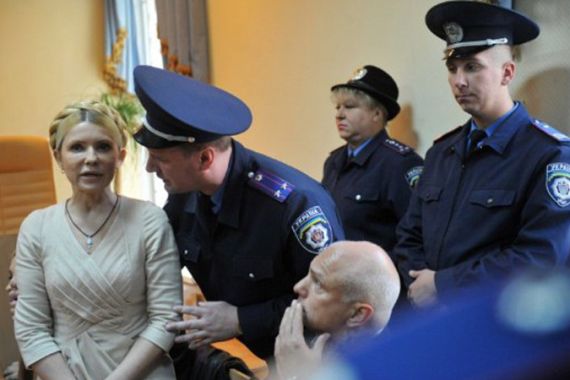Ukraine’s ex-PM jailed for seven years
Tymoshenko vows to fight on after being found guilty of abusing her authority in trial criticised by US, EU and Russia.

A court in Ukraine has sentenced Yulia Tymoshenko, the country’s former prime minister, to seven years in jail after finding her guilty of abusing her authority over a gas deal with Russia in 2009.
Judge Rodion Kireyev handed down the sentence on Tuesday, the maximum sought by state prosecutors, at the end of a three-month trial that has polarised society in the former Soviet republic and risks undermining Ukraine’s relations with the West.
The judge said her actions had led to a loss for Naftogaz of $188m.
Tymoshenko, 50, who described the trial as a “lynching” organised by President Viktor Yanukovich, her political rival, and denied any wrongdoing in negotiating the 2009 deal.
As the sentence was announced, Tymoshenko shouted “Glory to Ukraine!” to her supporters in the courtroom and vowed to fight on.
“We will fight and defend my good name in the European court,” she said. “We have to be strong and defend Ukraine from this authoritarianism. Today the court showed that the justice system has been crushed. Fight, be together, be strong.”
Her lawyers said they would appeal against the verdict.
About 2,000 Tymoshenko supporters, scores of police and crowds of anti-Tymoshenko demonstrators who turned out at the behest of the ruling Regions Party had gathered outside the court.
The European Union, a major trading partner of Ukraine, immediately denounced the judgment as politically motivated. Catherine Ashton, EU foreign policy chief, said the trial smacked of “selective” justice.
“The EU will reflect on its policies towards Ukraine,” she said in a statement on behalf of the EU, an apparent allusion to a planned association agreement that would entail a Ukrainian-EU free trade zone.
‘Verdict not final’
Amnesty International, the UK-based human rights group, also called for Tymoshenko’s release.
Under intense international pressure, Yanukovich said the verdict was not final and that he understood the EU’s anxiety over the case.
“It has made the European Union anxious and we understand why this is so,” he told reporters. “Today the court took its decision in the framework of the current criminal code. This is not the final decision,” he added.
He also hinted at possible imminent changes to the law which could benefit Tymoshenko.
But he admitted that “beyond doubt this is a regrettable case which is impeding the European integration of Ukraine today”.
Al Jazeera’s Paul Brennan, reporting from outside the court in Kiev, said: “Politically for Yanukovich it is going to be very difficult, because both America and the European Union have put considerable pressure on him not to push through this prosecution. They fear it’s a politically motivated prosecution,” he said.
‘Anti-Russian subtext’
The verdict was also criticised in Moscow. “We cannot but note a clear anti-Russian subtext to this entire story,” the foreign ministry said in a statement.
Vladimir Putin, the Russian prime minister, speaking on a visit to Beijing, said it could jeopardise energy relations between the two former Soviet states.
Tymoshenko, who had been held in police detention for contempt of court since August, was accused of exceeding her powers by ordering the state energy firm, Naftogaz, to sign a 2009 gas deal with Russia’s Gazprom.
Yanukovich government said that deal binded the country with an exorbitant price for Russian gas.
When the judge late last month called an adjournment until Tuesday, it was widely seen as a strategic pause to give Yanukovich and his advisers time to consider their options in the face of the Western criticism.
Her supporters say that Yanukovich wants to neutralise her as a political force before parliamentary elections next year.